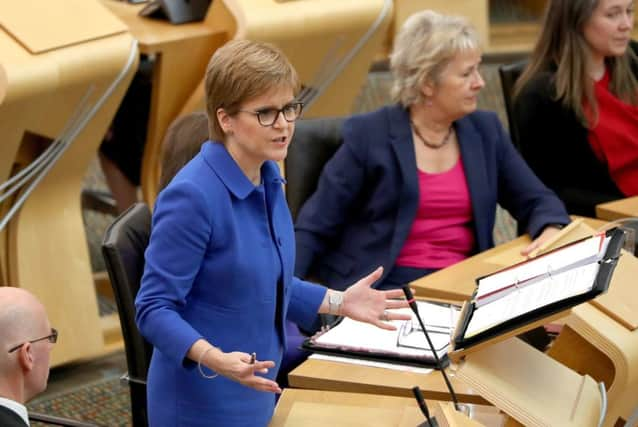Brexit: SNP opposition to snap elections hardens as polls says Scots Tories to lose all seats


The SNP has denied Boris Johnson any hope of securing a snap general election in order to keep his pledge of leaving the EU on 31 October, hardening its opposition to any vote before a delay to Brexit is secured.
First Minister Nicola Sturgeon said yesterday that the Prime Minister “mustn’t be allowed to dictate the timing” of an election, after earlier appearing to criticise Labour for not pushing ahead with a snap vote as soon as possible.
Advertisement
Hide AdAdvertisement
Hide AdIt means that legislation forcing the government to seek an extension to the Brexit deadline if no agreement is in place with Brussels by 19 October, which was passed by the House of Lords and will now receive Royal Assent, is set to come into effect before Mr Johnson is able to go to the country.
However, despite having his Brexit strategy taken apart by opposition parties, the Prime Minister threatened not to obey any law requiring to delay Brexit while on a visit to Scotland yesterday, risking an unprecedented constitutional crisis.
This week Mr Johnson said he would rather be “dead in a ditch” than request an extension.
Following the latest in a series of meetings on Friday, Labour, the Liberal Democrats, the SNP and Plaid Cymru are all understood to be planning on voting against or abstaining from the Fixed-Term Parliament Act when it returns to the Commons on Monday.
SNP Westminster leader Ian Blackford said he was “desperate for an election”, but it could not be until an extension to Article 50 was secured. He said he anticipated an election would be called “over the course of these weeks”.
Ms Sturgeon tweeted: “An early general election is now a question of ‘when’ not ‘if’ – but Johnson mustn’t be allowed to dictate the timing as a device to avoid scrutiny and force through a ‘no deal’ Brexit.
“The SNP relishes prospect of an election. But while our party interest might be served by voting for an election now, it is in the wider public interest to deny a PM threatening to defy the law any ability to cut and run in his own interests. We’ll act in the public interest.”
A Lib Dem spokeswoman said: “As a group we will all vote against or abstain on Monday.”
Advertisement
Hide AdAdvertisement
Hide AdLabour said the leaders discussed efforts to prevent a “damaging” no-deal Brexit and to hold an election “once that is secured”.
Meanwhile, a poll commissioned by the People’s Vote campaign, which is seeking a second referendum on EU membership, has suggested the Conservatives could lose all their seats in Scotland.
The YouGov poll, conducted in the 13 Conservative-held seats, pointed to a 14-point slump in the Tory vote share in those seats compared to the 2017 general election, 44 per cent to 30 per cent.
The SNP’s share of the vote in Scottish Tory seats set to increase by 8 points, from 34 per cent to 42 per cent.
A majority of voters in those seats would choose to keep the UK in the EU if there was another referendum, by 63 per cent to 37 per cent.
Speaking in Scotland before the figures were published, Mr Johnson insisted he doesn’t attach “enormous importance” to polls.
But in an attack on opposition parties for blocking an election, he went on: “If people do believe in the polls, then why aren’t they willing to have an election that’s what I don’t understand.”
The Prime Minister added he was “perplexed” that the SNP and Labour wanted to “run away from an election”.
Advertisement
Hide AdAdvertisement
Hide Ad“I’ve never known an opposition in the history of democracy that’s refused to have en election but that’s their choice,” he said. “I think obviously that they don’t trust the people.”
Peers approved the no-deal blocking legislation yesterday afternoon, after MPs including Tory rebels dealt Mr Johnson a major blow in the Commons by backing the Bill earlier in the week.
It is likely to become law on Monday after receiving the formal Royal Assent.
The MP who introduced the bill, Hilary Benn, said he was “delighted” but “troubled” that Mr Johnson may not abide by it.